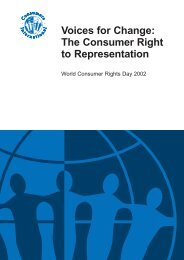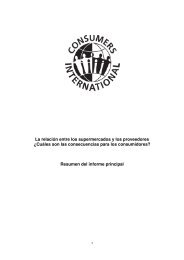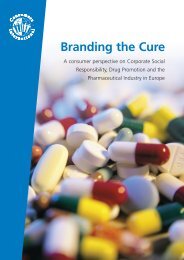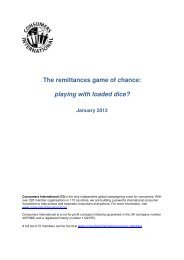Our money, our rights: - Consumers International
Our money, our rights: - Consumers International
Our money, our rights: - Consumers International
You also want an ePaper? Increase the reach of your titles
YUMPU automatically turns print PDFs into web optimized ePapers that Google loves.
An introduction from Joost Martens, Director General of <strong>Consumers</strong><br />
<strong>International</strong>.<br />
Access to stable, secure and fair financial services is important for consumers<br />
everywhere, including Africa. Despite relatively low levels of coverage by the formal<br />
banking sector, studies show that African consumers are willing and able to use a<br />
variety of financial services. Commonly held myths that poor consumers present<br />
too great a risk or are simply not interested in financial services are not borne out<br />
by the facts. Indeed, the phenomenon of micro-finance has firmly taken hold on the<br />
continent and is set to grow significantly. Nevertheless, despite demand, the<br />
financial services market is still significantly under-developed, and consumers go<br />
under-served. The evolution of financial services provision in Africa presents a<br />
number of interesting questions. Will African consumers be spared the negative<br />
consequences of mistakes made by others? Will governments promote the right<br />
conditions for this sector to thrive and work with all stakeholders to ensure that the<br />
consumer interest is upheld?<br />
This briefing explores the latest developments in this ongoing story. It is produced<br />
by <strong>Consumers</strong> <strong>International</strong> (CI) as part of celebrations for World Consumer Rights<br />
Day 2010.<br />
Poor people are interested in financial services.<br />
Savings ratios (ie the percentage of household income put aside), for example, are<br />
higher in middle-income countries (26%) than in high-income countries (23% 2 ). In<br />
Sub-Saharan Africa (SSA) the level is far from negligible at 15%. In 2000, Uganda<br />
had a rate of 3.5% (a similar level to that of the United States before global financial<br />
crisis), while the figure for the wider COMESA (Common Market for Eastern and<br />
Southern Africa) region was 18% 3 . This indicates a significant variability within and<br />
between regions.<br />
Page 2






![pkef]Qmf eg]sf] s] xf] < - Consumers International](https://img.yumpu.com/6479658/1/184x260/pkefqmf-egsf-s-xf-consumers-international.jpg?quality=85)
